“Collecting Newspapers – The Basics” (Part IV) – Setting Values…
March 25, 2024 by TimHughes · 532 Comments
We are often asked “What’s my newspaper worth?” in phone calls and email messages. As one might suspect, there are many factors which determine value and much like a jeweler cannot give a value of a diamond by an email or telephone inquiry, our ethics do not permit us to place values on newspapers without seeing the issues in hand.
Many factors determine value. The more important include condition, desirability among collectors, extent of coverage, completeness of the issue, proximity of the city of publication to where the event happened, time lag between the event date and the reporting date, dramatic appeal (more so with 20th century issues), and location of the report within the issue (front page? page 3?). Other factors come into play with more significant events but those noted are the prime determinants of value.
From a personal perspective setting values has been an interesting process, as no guide book of values existed 30+ years ago when I started the business. I priced an item in my catalog for $10 and if I had twenty orders for it I knew the price was too low. If no one ordered it the price was too high. Through the years, and by data basing sold prices (on index cards prior to the computer!), I’ve honed my own “price guide” based on actual sales, and it is this now-sophisticated database which we use to set values for new inventory as it arrives.
Do values continue to rise? In general, yes, but we are careful to never recommend the purchase of early newspapers for investment purposes. As is true of most collectibles, rarity and desirability determine where prices will be for the future.
But providing an historical perspective from our own files, back in October of 1981 we sold in our catalog #26 the NEW YORK HERALD of March 5, 1865 reporting the inauguration of Abraham Lincoln, very nice condition, for $70. In 2018 we sold another issue of the NEW YORK HERALD of March 5, 1865, also in very nice condition, for $745. If we had a similar issue today, it would likely go for around $1,000 – and even more if offered through a prominent auction house.
So, what do you do if you have a newspaper and would like to know its approximate value? One resource is this Blog – not for posting questions, but for exploring. We have many posts which provide specific examples of issues and their prices. Perhaps a better resource is the Rare & Early Newspapers website which provides 10,000+ examples (best to search by date and look for a comparable – see image below). Once you’ve explored these avenues, you are always welcome to contact us directly by email (guy@rarenewspapers.com). We would need the exact title and exact date of each issue to get started. Sending only photos does not work for us.
What two resources are not helpful?
1) Ebay. Why? Just because someone is asking for an amazing price doesn’t mean they’ll ever sell it at that price. “Previous Sales” are what matters.
2) Posting a question on this Blog. Why? We rarely monitor it.
Feel free to send any additional questions concerning the valuation of newspaper to us at the same email shown above. We’ll do our best to answer any that come our way… and who knows, perhaps they show up in a future post. 🙂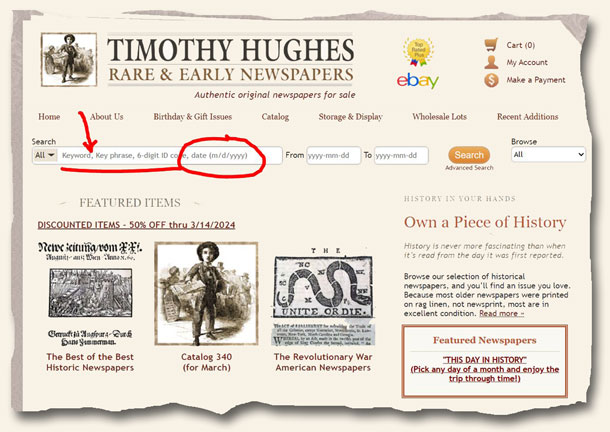
The meanderings of those who collect Rare & Early Newspapers…
August 11, 2023 by GuyHeilenman · Leave a Comment
One of the more difficult challenges the staff at Timothy Hughes Rare & Early Newspapers face on a near-daily basis is to not be (too often) distracted by that which makes the hobby itself so interesting: that is, that one never knows what one may find while perusing an old newspaper… nor where it may lead. In other words, to not become endlessly distracted. It really is the “back in the good old days” version of surfing the web. This isn’t to say the meanderings are bad per se, for if we permit ourselves to be carried away for a period of time there is much to learn; however, if permitted to get out of hand the phone would be ringing off the hook from collectors wondering why their purchases, which will likely lead to their own meanderings, have yet to ship. Combining the old (rare newspapers) with the new (the internet) has only exacerbated the temptation.
One minor instance occurred just a few weeks ago which, if you have a few minutes to spare, I’d like to share with you.
We recently purchased a set of The National Era which included many of the original installments of the serialized printing of Uncle Tom’s Cabin by Harriet Beecher Stowe. While tagging the issues which contained segments of her profoundly culture-altering novel, we noticed several issues which did not have portions still contained related articles. This led us to do an internet search for additional titles (newspaper publications) which had Uncle Tom’s Cabin themed coverage… and this is where the fun began.
I expected the big boys (The New York Times, Tribune, and Herald, along with other notable papers such as the Philadelphia Inquirer and The Liberator) to have mentions. However, I did not expect to see coverage of the book in The Saturday Evening Post – and as fate would have it, the issue referenced was one buried deep within our archives. Off I went to find the July 29, 1865 issue. Hoping for a glorious, detailed report, what I found instead was a poem with a mere mention. Still, although a bit disappointed, I was intrigued by the first line of the article: “There are fragments of songs that nobody sings”, by B. F. Taylor. After having my curiosity piqued by the line, and my sleeping heart stirred by the article itself, I headed back to the internet to find the text of the entire poem (which turned out to be significantly more challenging – dare I say time-consuming – than expected). Once found and read, the entirety of the trek to this point caused me to sense the tension between hope and sorrow… which led me to wonder how those who lived in the mid-1800’s morphed from anger (having read Uncle Tom’s Cabin), to hopelessness (seeing little-to-no change in the state of slavery since their “forefathers” had agreed it should be abolished, but did not do so for fear that the doing so would cause their quest to become a “united” group of states to fail), to hope in a trickle… and then a stream… and then a flood… and then a bloody tidal wave called the American Civil War… to deep sorrow (for the sins of the past and deadly consequences thereof), to restored hope and wonder (in what the future might hold).
Although at this point I could hear my daily tasks calling, this mental excursion was not to be stifled for it had caused me to recall a certain illustration from the cover of the Harper’s Weekly dated November 3, 1866) – a woodcut print of which I was familiar, yet one I had never taken the time to read the blurb describing it. Not wanting to let my travels come to an end with a whimper, I read the short description – And this led me to my final question and motivation for writing this verbose post: When/how did the moniker “Uncle Tom”, born from the text which had been instrumental in vanquishing slavery, morph from being a term of endearment to a gross insult? While the road I had taken did not lead me to new “finds” within our inventory, it did awaken my heart to the plight of slavery and my mind to the understanding of why a nickname which had once been bestowed on someone with kindness and admiration had transformed into one of the greatest cultural (and political) insults aimed at black Americans. The latter I learned by one more trip to the internet: When ‘Uncle Tom’ Became an Insult
The following photos provide a visual glimpse of my meanderings, with the poem by B. F. Taylor saved for last. If you made it this far, thanks for indulging me. Please know if you decide to start collecting rare and early newspapers, this condition is highly contagious. If you already are a collector, you already know.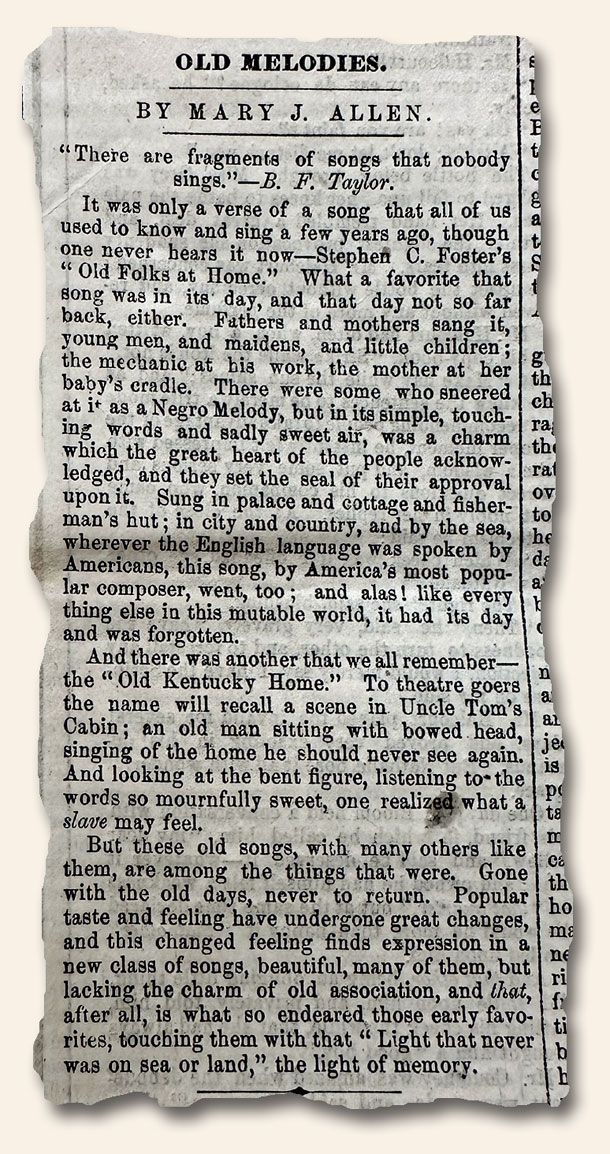

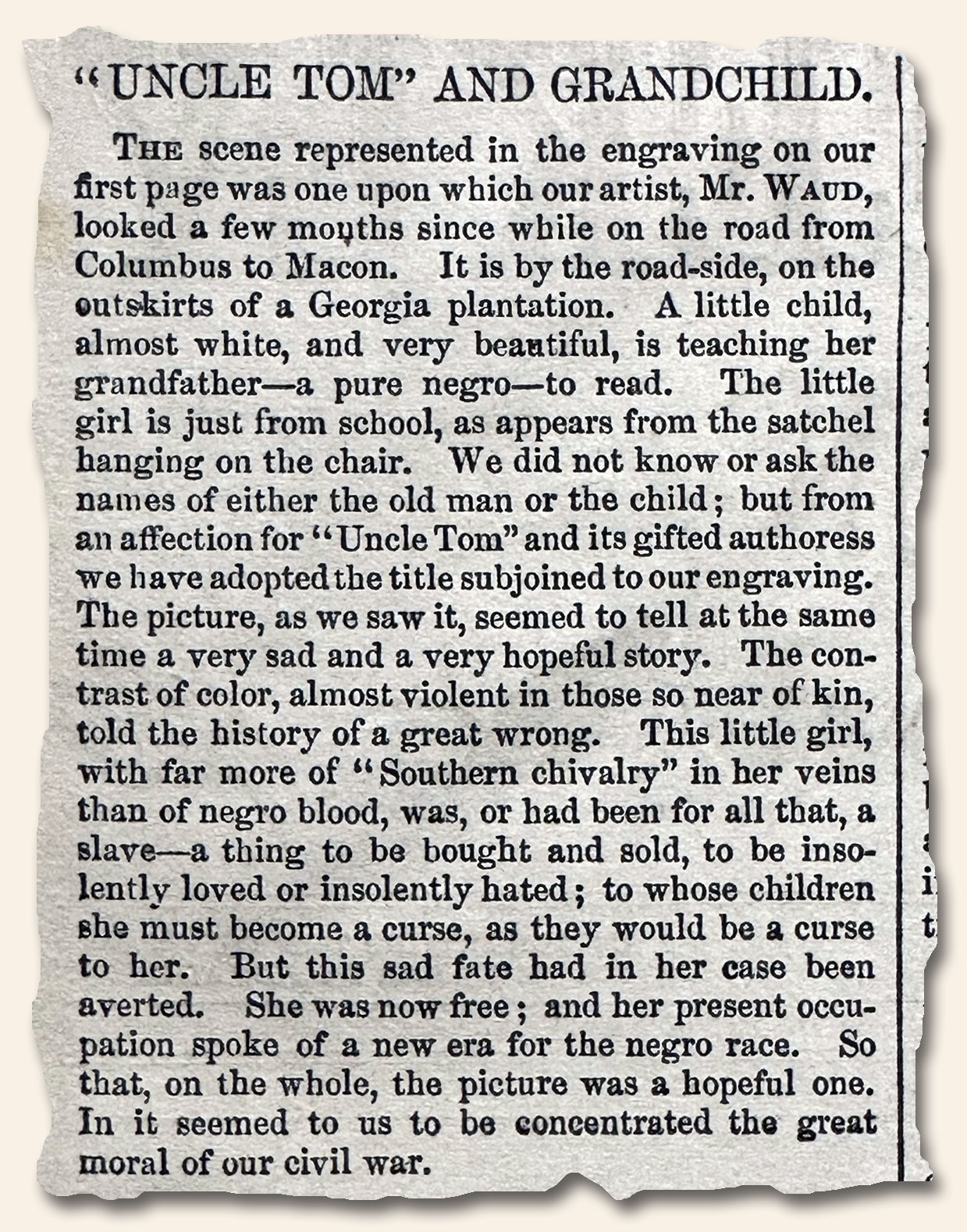
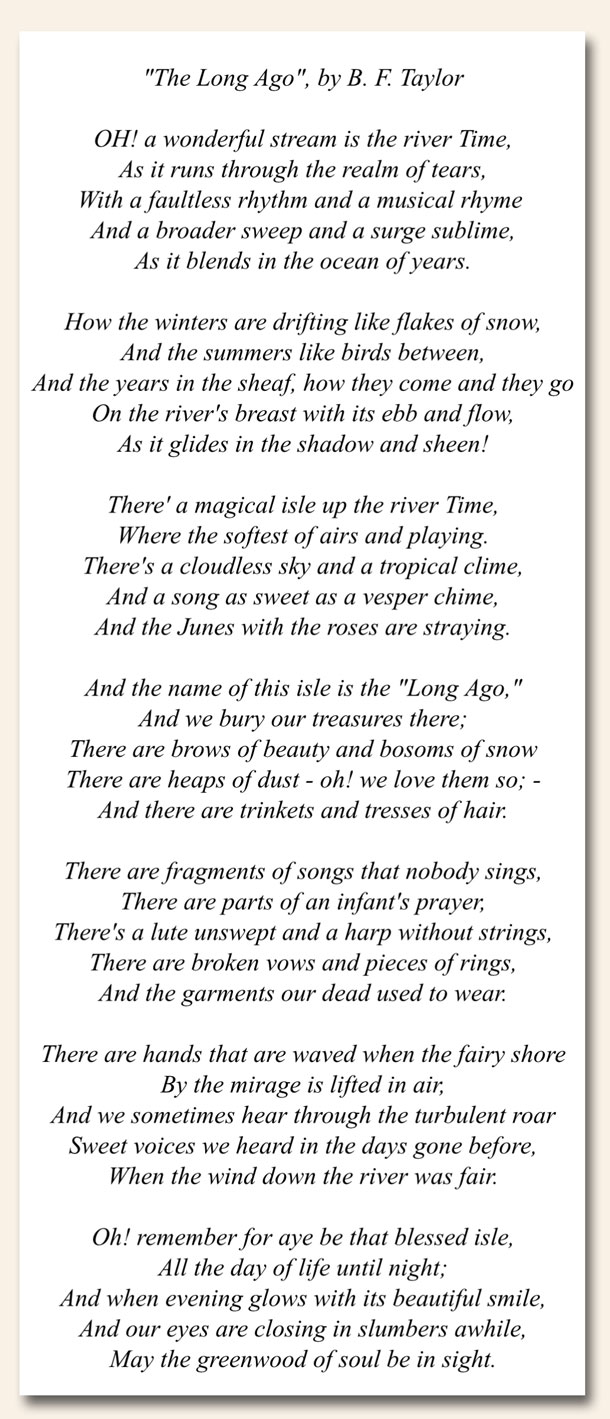
Our obsession with “firsts”… History gives us plenty – including John Rock…
November 28, 2022 by Laura Heilenman · Leave a Comment
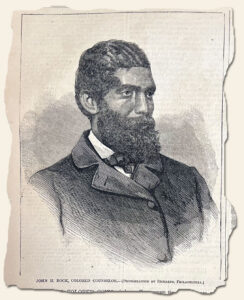 We are a people enamored with firsts: our 1st kiss … finishing in 1st place… 1st to fly… 1st to discover “The New World” (still up for debate)… When I study Scripture, I love using something called “the law of first mention” which says, we best understand a particular word or doctrine by finding and then learning all about the first place in Scripture the word or doctrine was revealed. We also love the 1st man on the moon, the 1st rock opera – and the list goes on and on. Speaking of 1sts…
We are a people enamored with firsts: our 1st kiss … finishing in 1st place… 1st to fly… 1st to discover “The New World” (still up for debate)… When I study Scripture, I love using something called “the law of first mention” which says, we best understand a particular word or doctrine by finding and then learning all about the first place in Scripture the word or doctrine was revealed. We also love the 1st man on the moon, the 1st rock opera – and the list goes on and on. Speaking of 1sts…
On February 2, 1865, THE NEW YORK TIMES gave us another first to appreciate, and then later, on February 25, 1865, HARPER’S WEEKLY put a face on this first: that is, John Rock becoming the first African American attorney admitted to the bar of the U.S. Supreme Court. The New York Times stated in part: “J. S. Rock, of the Supreme Court of Massachusetts, was to-day, on motion of Senator Sumner, admitted an Attorney and Counsellor in the Supreme Court of the United States.” Quite historic!
Whether we are reading or collecting “early” newspapers, history provides us with a fascinating list of 1sts which can be celebrated and studied… 1st shut out in baseball… 1st Hispanic Supreme Court Justice… shall I go on?
Time-Lapse… Frederick Douglass (1834) to Henry Garnett (1865)…
November 24, 2022 by GuyHeilenman · Leave a Comment
As I continue to slowly devour every word of the autobiography, “The Life and Times of Frederick Douglass”, I was recently moved to as close to tears as I come as I pondered his retelling of the crushing hopelessness he felt after having been beaten to a whisper of death:
“I have often, in the deep stillness of a summer’s Sabbath, stood all alone upon the banks of that noble [Chesapeake] bay, and traced, with saddened heart and tearful eye, the countless number of sails moving off to the mighty ocean. The sight of these always affected me powerfully. My thoughts would compel utterance; and there, with no audience but the Almighty, I would pour out my soul’s complaint in my rude way with an apostrophe to the moving multitude of ships.”

‘You are loosed from your moorings, and free. I am fast in my chains, and am a slave! You move merrily before the gentle gale, and I sadly before the bloody whip. You are freedom’s swift-winged angels, that fly around the world; I am confined in bonds of iron. O, that I were free! O, that I were on one of your gallant decks, and under your protecting wing! Alas! betwixt me and you the turbid waters roll. Go on, go on; O, that I could also go! Could I but swim! If I could fly! O, why was I born a man, of whom to make a brute! The glad ship is gone: she hides in the dim distance. I am left in the hell of unending slavery. O, God, save me! God, deliver me! Let me be free!–Is there any God? Why am I a slave? I will run away. I will not stand it. Get caught or get clear, I’ll try it. I had as well die with ague as with fever. I have only one life to lose. I had as well be killed running as die standing. Only think of it: one hundred miles north, and I am free! Try it? Yes! God helping me, I will. It cannot be that I shall live and die a slave. I will take to the water. This very bay shall yet bear me into freedom. The steamboats steer in a northeast course from North Point; I will do the same; and when I get to the head of the bay, I will turn my canoe adrift, and walk straight through Delaware into Pennsylvania. When I get there, I shall not be required to have a pass: I will travel there without being disturbed. Let but the first opportunity offer, and come what will, I am off. Meanwhile I will try to bear the yoke. I am not the only slave in the world. Why should I fret? I can bear as much as any of them. Besides I am but a boy yet, and all boys are bound out to someone. It may be that my misery in slavery will only increase my happiness when I get free. There is a better day coming.’
I shall never be able to narrate half the mental experience through which it was my lot to pass, during my stay at Covey’s. I was completely wrecked, changed, and bewildered; goaded almost to madness at one time, and at another reconciling myself to my wretched condition.”
All bound by the common thread of having been given the breath of life by the same Creator, how could one “brother” treat a fellow sojourner with such abject cruelty? This goes beyond black and white as the relationship between slave an owner has played out similarly since the dawn of time, however, will it never end? Would ”The Almighty” hear his cry?
Fastforward approximately 30 years. Frederick Douglass is now free, residing in the North, and is living a life of gratitude expressed by his exhaustive efforts for the cause of abolition. Slaves are on the cusp of being emancipated, and for the first time in the history of the United States, a former slave of African descent, Rev. Henry Garnett, was permitted to preach (a common occurrence for whites) at The Capital. The article below regarding this event was printed in the New York Tribune, dated February 13, 1865. There would still be many obstacles to overcome before former slaves (or their descendants) would be viewed as “equal under the law”, and some might (rightfully) argue additional progress still needs to be made, but in this moment in time, with the Frederick Douglass quote fixed firmly in my mind and weighing heavy on my heart, I am grateful for the hope provided by the gains which have been made through time.

A Fly on the Wall… The Birth of a State….
July 22, 2022 by GuyHeilenman · Leave a Comment
This is the second in the series… “A Fly on the Wall”.
It recently occurred to me that those of us at Rare & Early Newspapers have the unique opportunity to view the passage of time through the abundance of historical reports found within our extensive inventory. One case in point: In 1876 Colorado achieved Statehood, and like all of America’s states, its citizens had done much work, achieved lofty goals, and covered extensive ground before their adoption into the United States of America. The following issue of THE WEEKLY ROCKY MOUNTAIN NEWS, Denver, Colorado, Nov. 15, 1865, is a sneak peek into Colorado Territory years before its big day of adoption. It would have been fun to be a fly on the wall during the proceedings which marked its statehood birth.
While the newspaper shown below is the earliest Colorado newspaper we currently have on hand, each issue covering a territory’s journey to statehood gives a fascinating look into the hearts and minds of those who formed the backbone of this great country.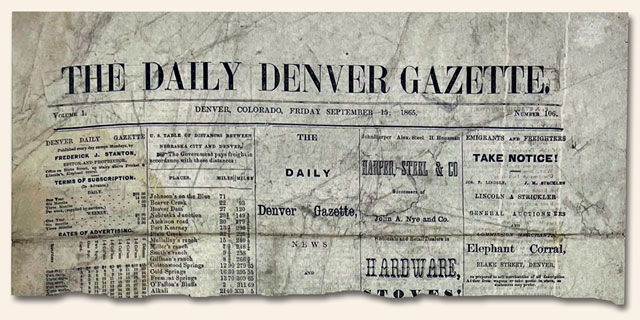
Juneteenth Revisited – “The rest of the story”…
June 27, 2022 by GuyHeilenman · Leave a Comment
 Roughly a week ago we were observing the most recent addition to our list of Federal Holidays: Juneteenth, which commemorates the day when Union troops marched into Galveston, Texas and Major General Gordon Granger informed the people of Texas that all enslaved people were now free. His General Order (No. 3) stated: “The people of Texas are informed that, in accordance with a proclamation from the Executive of the United States, all slaves are free…”. However, what is that at the end? Dot, dot, dot? There’s more?
Roughly a week ago we were observing the most recent addition to our list of Federal Holidays: Juneteenth, which commemorates the day when Union troops marched into Galveston, Texas and Major General Gordon Granger informed the people of Texas that all enslaved people were now free. His General Order (No. 3) stated: “The people of Texas are informed that, in accordance with a proclamation from the Executive of the United States, all slaves are free…”. However, what is that at the end? Dot, dot, dot? There’s more?
His full order reads as follows: “The people of Texas are informed that, in accordance with a proclamation from the Executive of the United States, all slaves are free. This involves an absolute equality of personal rights and rights of property between former masters and slaves, and the connection heretofore existing between them becomes that between employer and hired labor. The freedmen are advised to remain quietly at their present homes and work for wages. They are informed that they will not be allowed to collect at military posts and that they will not be supported in idleness either there or elsewhere.” In other words, “You are free, but if you think the government is going to support you if you leave your new ’employer’, think again.” For many, this would be analogous to someone who was bound, kidnapped, and being transported by airplane to some horrible location having their bindings removed and told they were welcome to leave any time they want (albeit, at 10,000 feet without a parachute). While this Order is quite historic, and the day does deserve to be celebrated, there is a whiff of Hotel California in the air: “You can check-out any time you like, but you can never leave!”
Am I exaggerating – misrepresenting the circumstances? One might think so, but an article I recently discovered within a July 16, 1865 issue of The New York Times which printed a follow-up Order by General Granger given approximately one week later begs to differ: 
Even when granted with good intentions, freedom needs to be embraced – and the “doing so” is often fraught with hardship. However, while the struggle continues, taking time to celebrate this momentous occasion (along with the many victories which have occurred since June 19, 1865) is worthy of our unified, citizen-wide efforts – regardless of our racial, social, political, religious or economic differences. The intrinsic hope of “We The People!” must ever be before us.
Fascinating Conspiracies (Episode 1) – The Lincoln Conspirators…
October 21, 2021 by Laura Heilenman · Leave a Comment
 Sometimes it is difficult to determine if a person really is a philosopher. So it is with the author of the profound statement, “Just because you’re paranoid doesn’t mean they aren’t after you”. Philosophical or lyrical, it is the perfect jumping off point for a short series on more obscure conspiracies in American History. Sure, we have all heard of John Wilks Booth and Lee Harvey Oswald. Perhaps we have even heard of George Atzerodt, who conspired with Booth to assassinate Lincoln and Johnson however, there are others that will most defiantly leave you a bit slack-jawed if not curious. To begin our series, let’s start with our 16th President and those who colluded to bring about his demise. Booth’s main conspirators, George Atzerodt, David Herold, Lewis Powell and Mary Surratt had their own press coverage, even if they were not quite as infamous as the malicious actor Booth, but reading their confessions and stories can bring this horrific event into clearer focus. So, hopefully you will enjoy reading these Lincoln Conspiracy issues… and, until next time, remember the wise words of Kurt Cobain and keep looking over your shoulder.
Sometimes it is difficult to determine if a person really is a philosopher. So it is with the author of the profound statement, “Just because you’re paranoid doesn’t mean they aren’t after you”. Philosophical or lyrical, it is the perfect jumping off point for a short series on more obscure conspiracies in American History. Sure, we have all heard of John Wilks Booth and Lee Harvey Oswald. Perhaps we have even heard of George Atzerodt, who conspired with Booth to assassinate Lincoln and Johnson however, there are others that will most defiantly leave you a bit slack-jawed if not curious. To begin our series, let’s start with our 16th President and those who colluded to bring about his demise. Booth’s main conspirators, George Atzerodt, David Herold, Lewis Powell and Mary Surratt had their own press coverage, even if they were not quite as infamous as the malicious actor Booth, but reading their confessions and stories can bring this horrific event into clearer focus. So, hopefully you will enjoy reading these Lincoln Conspiracy issues… and, until next time, remember the wise words of Kurt Cobain and keep looking over your shoulder.
Political bias no stranger to today’s newspapers…
October 23, 2017 by TimHughes · Leave a Comment
It seems the polarizing of day’s media is greater than ever, but it is certainly nothing new under the sun. Practically since the creation of the first newspaper political opinion was a focus the publisher, supporting or opposing the efforts of those in power. And as popular as we view Abraham Lincoln today (he consistently ranks among the top three in scholarly polls) he was not liked by all during his time in office.
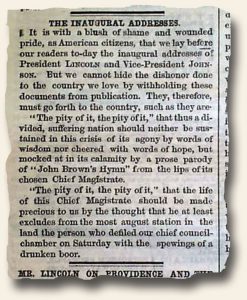 “The World” newspaper from New York City was the leading democratic organ at the time, while Lincoln was a Republican. In their issue of March 6, 1865 which reported his inauguration & inaugural address the editorial page contained at least two biting commentaries. One includes in part: “It is with a blush of shame and wounded price, as American citizens, that we lay before our readers to-day the inaugural address of President Lincoln…But we cannot hide the dishonor done to the country we love by withholding these documents from publication…The pity of it…that the life of this Chief Magistrate should be made precious to us by the thought that he at least excludes from the most august station in the land the person who defiled our chief council chamber on Saturday with the spewings of a drunken boor…”.
“The World” newspaper from New York City was the leading democratic organ at the time, while Lincoln was a Republican. In their issue of March 6, 1865 which reported his inauguration & inaugural address the editorial page contained at least two biting commentaries. One includes in part: “It is with a blush of shame and wounded price, as American citizens, that we lay before our readers to-day the inaugural address of President Lincoln…But we cannot hide the dishonor done to the country we love by withholding these documents from publication…The pity of it…that the life of this Chief Magistrate should be made precious to us by the thought that he at least excludes from the most august station in the land the person who defiled our chief council chamber on Saturday with the spewings of a drunken boor…”.
The other can be seen in the photos.
This is why collectors love broadsides…
January 23, 2017 by TimHughes · Leave a Comment
When notable news breaks in today’s world, regular television and radio schedules are canceled in favor of newscasters bringing the world the latest on the event as it happens. During the Civil War, a newspaper would put out a “broadside” edition, a quickly-produced piece on a single sheet and printed on the front side only, with text limited to the event being covered. Waiting for the next day’s edition was not an option for the most competitive of newspapers.
A recent addition to our inventory is one of the best Civil War broadsides we have seen. Using type dramatically larger than found in any regular edition the broadside screams: “LATEST! The Final Blow. RICHMOND TAKEN.” The brief text provides a same-day report of the capture of the Confederate capital, with a date stamp of 11:20 noting: “…General Grant states Petersburgh has been evacuated and believe Richmond also.” And then another date stamp just ten minutes later reports: “A dispatch from E. M. Stanton announces the capture of RICHMOND by our troops under Gen. Weitzel, they having taken it about 8:15 this morning.”
The immediacy of the report along with the dramatic, graphic presentation are what excite collectors. Add to this the significance of the fall of the rebel capital and you have a terrific newspaper just perfect for display.
Discretion was the better part of valor…
January 19, 2017 by TimHughes · Leave a Comment
Wounds from the Civil War were still very fresh in the hearts & minds of the Southerners in the months after the Civil War, and perhaps sensitivities were no more acute than among the residents of Richmond, the capital of the Confederacy up to the closing days of the war.
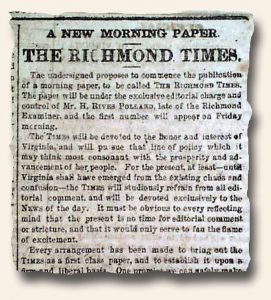 With this in mind, a new newspaper was begun in the city of Richmond during the closing day of April, 1865, the same month the capital fell to the Yankees. The newspaper was announced in the April 20 issue of the “Richmond Whig”, the announcement headed: “A New Morning Paper – The Richmond Times” and the text including: “…The paper will be under the exclusive editorial charge & control of Mr. H. Rives Pollard, late of the Richmond Examiner, and the first number will appear on Friday…will be devoted to the honor and interest of Virginia…For the present at least–until Virginia shall have emerged from the existing chaos and confusion–the Times will studiously refrain from all editorial comment & will be devoted exclusively to the news of the day. It must be obvious to every reflecting mind that the present is no time for editorial comment or stricture, and that it would only serve to fan the flame of excitement…”.
With this in mind, a new newspaper was begun in the city of Richmond during the closing day of April, 1865, the same month the capital fell to the Yankees. The newspaper was announced in the April 20 issue of the “Richmond Whig”, the announcement headed: “A New Morning Paper – The Richmond Times” and the text including: “…The paper will be under the exclusive editorial charge & control of Mr. H. Rives Pollard, late of the Richmond Examiner, and the first number will appear on Friday…will be devoted to the honor and interest of Virginia…For the present at least–until Virginia shall have emerged from the existing chaos and confusion–the Times will studiously refrain from all editorial comment & will be devoted exclusively to the news of the day. It must be obvious to every reflecting mind that the present is no time for editorial comment or stricture, and that it would only serve to fan the flame of excitement…”.
It is nice to read that there was compassion among the victorious Yankees as the occupied Richmond. There were certainly options that could only have hurt the cause of reunion, but the publisher wisely opted to consider discretion as the better part of valor.


